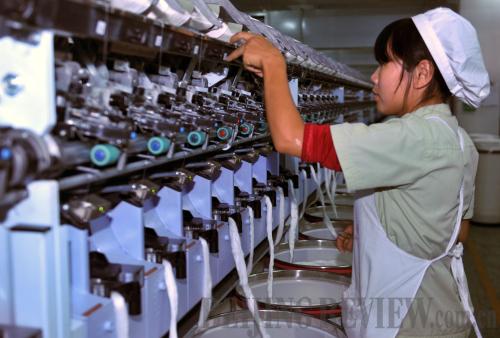|
Comprehensive support
 |
|
SMALL BUT VITAL: The Textile sector, mainly consisting of SMEs, has become one of the pillar industries in Wujiang, east China's Jiangsu Province (CHEN QI) |
In addition to widening credit channels, the government earmarked 10.89 billion yuan ($1.59 billion) from the central budget to support SMEs' development last year, more than doubled the government's 2008 commitment of 4.99 billion yuan ($725 million), Li said.
As generous as allocated funds for SMEs have been, more money is needed to further enhance the sector. "The special fund for the development of SMEs was small and its support for SMEs was not enough as a result of segmented distribution," said Li, adding the country will gradually need to expand its special fund for SMEs and focus allocations on technological innovations, structural adjustments, emission cuts, expanding markets and creating jobs.
The government also made several preferential fiscal and tax policies. In 2010, small low-profit enterprises with an annual taxable income less than 30,000 yuan ($4,394) can calculate their taxable income at 50 percent of their actual income and pay enterprise income taxes at a rate of 20 percent, according to a recent announcement by the Ministry of Finance (MOF) and the State Administration of Taxation (SAT).
In response to arbitrary charges, the country will strictly implement a public notice system regulating charge collection on SMEs. In 2009, China canceled 100 administration-related charges worth 36 billion yuan ($5.3 billion), including residence permit fees and household removal administration fees.
"All administrative and governmental charges that were not approved shall be canceled to relieve the burden on SMEs," said Li.
Concerning employment, four support policies will be extended until the end of 2010, said a notice released by the MOF and the SAT last December. The support policies allow the financially strained enterprises to defer social security fees and pay insurance at a lower rate, while stabilizing employment with unemployment insurance funds and encouraging on-the-job training for employees.
Measures to Boost SME Development
Li Yizhong, Minister of Industry and Information Technology, said that future work will focus on the following aspects:
Implementing the SME Promotion Law and related regulations. Conducting research to establish the measures for credit guarantees for SMEs, while breaking up monopolies in certain industries and creating policies to encourage private investment.
Providing more fiscal and tax-related support. Gradually increasing the special fund for the central budget to aid SMEs and establishing a national SME development fund. Also, putting in place preferential policies to reduce income taxes for SMEs by half.
Alleviating financing difficulties. Increase the scale and proportion of loans to SMEs, while accelerating the development of the ChiNext and improving credit guarantees for SMEs.
Promoting structural adjustments and upgrades. Investing more in research and development to improve SMEs' technological innovations and product quality.
Improving the social service system. Guiding and supporting an array of service agencies to offer information, training, investment and financing, quality inspection, and management services to SMEs.
Strengthening management. Provide more consultation to SMEs, helping them to strengthen their basic management infrastructure, improving operation systems, completing management structures, and promoting management innovations. Guiding SMEs to adopt advanced management practices and improve their operation and management levels and anti-risk abilities.
| 